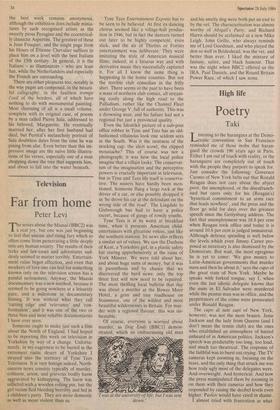Television
Far from home
Peter Levi
The series about the Maasai (BBC2) was a real joy, but one was just beginning to feel that unease and rising fury which so often come from penetrating a little deeply into any human society. The results of their treks and law-cases and adventures sud- denly seemed to matter terribly. Entertain- ment value begot affection, and even that mockery of love one can feel for something known only on the television screen has a painful seriousness. Anyway, the Maasai documentary was a new method, because it seemed to be going nowhere at a leisurely pace, and a milestone in documentary filming. It was without what they call 'cutting edge' and 'relevance' and 'con- frontation', and it was one of the two or three best and most reliable documentaries I have ever seen.
Someone ought to make just such a film about the North of England. I had hoped to be reporting this week on television in Yorkshire by way of a change. Unfortu- nately, in my eagerness to be buried in the extremest rustic desert of Yorkshire I strayed into the territory of Tyne Tees Television. It is very foreign indeed, North- eastern news consists typically of murder, collision, arson, and grievous bodily harm aggravated by kidnapping. The harm was inflicted with a wooden rolling pin, but the girl victim fled bleeding horribly and hid in a children's party. They are more domestic as well as more violent than us. Tyne Tees Entertainment Express has to be seen to be believed. At first its dancing chorus seemed like a village-hall produc- tion in 1946, but in fact the dancers turned out later to be highly competent, even slick, and the air of Thirties or Forties entertainment was deliberate. They were imitating the style of American musical films; indeed, in a fatuous way and with derivative music they successfully captured it. For all I know the same thing is happening in the home counties. But not the terrible club comedian in the frilly shirt. There seems in the past to have been a mass of northern club comics, all stream- ing cosily along the high road to the Palladium, rather like the Channel Fleet under George V, full of authority. This was a drowning man, and his failure had not a regional but just a provincial quality.
Even the Identikit picture of a sub-post office robber in Tyne and Tees has an old- fashioned villainous look one seldom sees in the South. Was it the neatness of the stocking cap, the alert scowl, the clipped moustache? This of course was not a photograph; it was how the local police imagine that a villain looks. The conservat- ism of the imagination and the perceptive powers is crucially important in television, but in Tyne and Tees life itself is conserva- tive. The miners have hardly been men- tioned. Someone flung a large rock at the driver of a car, or else possibly dropped it as 'he drove his car at the defendant on the wrong side of the road'. The Lingdale to Gisborough bus had to have a police escort, because of gangs of rowdy youths.
Tyne Tees is at its worst at breakfast time, when it presents American child- entertainers with glycerine voices, just like the southern stations. Its news also reflects a similar set of values. We saw the Duchess of Kent, a Yorkshire girl, in a plastic safety hat staring apprehensively at the ruins of York Minster. We were told about her, and about huge sums of money, but it was in parenthesis and by chance that we discovered the hard news: only the top three feet will now need to be repaired. The most thrilling local bulletin that day was about a murder at the Bowes Moor Hotel, a grim and tiny roadhouse on Stainmoor, one of the wildest and most beautiful wildernesses in Britain. For mur- der with a regional flavour, this was un- beatable.
Of course, everyone is worried about murder, as Dog Ends (BBC1) demon- strated, which an embarrassing old man
'I was at the university of life, hat I was sent down.' and his smelly dog were both put an end to by the vet. The characterisation was almost worthy of Abigail's Party, and Richard Harris should be acclaimed as a new Mike Leigh. John Grillo, who always reminds me of Lord Goodman, and who played the don so well in Brideshead, was the vet, and better than ever. I liked the mixture of fantasy, satire, and black humour. That was the night when BBC2 offered us the IRA, Paul Daniels, and the Round Britain Power Race, of which I saw none.










































 Previous page
Previous page